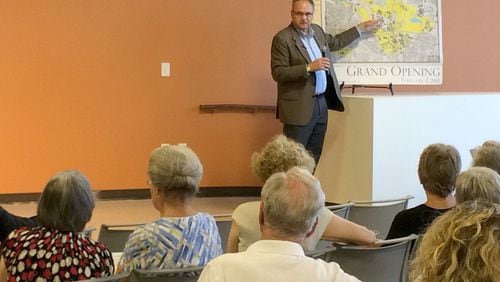Emory University hopes to make official what many outside the metropolitan area already assume to be the case: It wants the 631-acre campus to become a part of the city of Atlanta.
The school's annexation into the city wouldn't change much immediately, but it could lead to the construction of a light rail MARTA line to the school by tapping into the city's transportation revenue.
Emory is currently part of unincorporated DeKalb County in the Druid Hills area, just east of Atlanta's border.
“Emory already promotes its location as Atlanta, is known internationally as being located in Atlanta, routinely recruits faculty and students to Atlanta, and has an Atlanta address and zip code,” the university wrote in a statement. “The prestige of Emory as an international university and Atlanta as a global city are inextricably linked.”
Some of the school’s neighbors worry that the private research university’s annexation could trigger a domino effect: If the Druid Hills community follows the private research university into the city, DeKalb public schools could become part of Atlanta’s school system, and nearby municipalities could also try to annex nearby properties.
Emory officials didn’t explain further why the school wants to join Atlanta, bringing 15,000 students and more than 29,000 employees into the city.
But several residents and officials said at a community meeting Monday they believe Emory is trying to get city funding for a MARTA light rail line.
The Clifton Corridor proposal would connect the Lindbergh and Avondale MARTA stations, running through Emory's campus. The public transportation plan has been in the works for years already, but it has so far lacked a funding source. Emory has limited parking on campus and is often congested with traffic.
Money for the Atlanta portion of the project could come from a half-cent-per-dollar sales tax that city voters will decide on during November's elections. If approved, proceeds will go toward transportation improvements to the Atlanta Beltline, streetscapes, traffic lights — and possibly the Clifton Corridor MARTA line.
“There seems to be an emerging consensus that transportation is Emory’s primary driver,” said DeKalb Commissioner Jeff Rader at the meeting.
Emory plans to petition the Atlanta City Council for the annexation before the end of the year.
Under Georgia law, a property owner may apply for annexation as long as it shares at least a 50-foot boundary with the city. Emory’s western edge comes close to the city, but maps of the area don’t clearly show whether they share a border. Approval by the Georgia General Assembly isn’t required for this annexation method.
Atlanta Mayor Kasim Reed welcomed the annexation proposal, according to a statement from his communications office.
“If successful, the annexation of this vital corridor would present the rare opportunity to bring a world-class teaching and research institution, strong neighborhoods, hundreds of thriving commercial and industrial businesses and the leading national public health institute of the United States into the city of Atlanta,” the statement said.
Some community members said they fear Emory's annexation could motivate the surrounding Druid Hills neighborhood to also join Atlanta, dividing their communities by political and school district boundaries. A proposal to annex Druid Hills into Atlanta last year didn't advance at the Georgia General Assembly.
“I have a lot of concerns about what the annexation would mean in the long term for the fiscal health of the school district,” said Tanya Myers, who has two children in DeKalb schools. “Our school district has made tremendous progress. I’ve seen parental confidence grow.”
The Druid Hills neighborhood isn't pursuing annexation into the city, said Anne Wallace, president of the Druid Hills Civic Association. But some streets within the area could opt to join Atlanta.
The financial impact on DeKalb County’s government would be minimal because Emory doesn’t pay property taxes on its educational buildings, though retail properties like Emory Point do contribute taxes that would be largely transferred to the city of Atlanta if the annexation passes, said DeKalb spokesman Burke Brennan.
“The annexation of Emory University into the city of Atlanta would have other implications to consider that are not fiscal, like the schools,” Brennan said. “CEO Lee May has pointed out that the General Assembly should enact legislation to ensure equity and fairness as it pertains to annexations and new incorporations.”
Atlanta City Councilman Alex Wan said Emory’s annexation could start a broader conversation about whether nearby areas also want to join the city.
“Annexations are always tricky, complicated and emotional,” said Wan, who would recuse himself from voting on the annexation proposal because he works for Emory.
STORY SO FAR
What happened: Emory University announced it has begun the process to annex its campus into the city of Atlanta.
The latest: The university's annexation could lead to the construction of a light-rail MARTA line.
What's next: Emory plans to submit an annexation petition to the Atlanta City Council before the end of the year.







